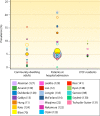Understanding Clostridium difficile Colonization
- PMID: 29540433
- PMCID: PMC5967689
- DOI: 10.1128/CMR.00021-17
Understanding Clostridium difficile Colonization
Abstract
Clostridium difficile is the main causative agent of antibiotic-associated and health care-associated infective diarrhea. Recently, there has been growing interest in alternative sources of C. difficile other than patients with Clostridium difficile infection (CDI) and the hospital environment. Notably, the role of C. difficile-colonized patients as a possible source of transmission has received attention. In this review, we present a comprehensive overview of the current understanding of C. difficile colonization. Findings from gut microbiota studies yield more insights into determinants that are important for acquiring or resisting colonization and progression to CDI. In discussions on the prevalence of C. difficile colonization among populations and its associated risk factors, colonized patients at hospital admission merit more attention, as findings from the literature have pointed to their role in both health care-associated transmission of C. difficile and a higher risk of progression to CDI once admitted. C. difficile colonization among patients at admission may have clinical implications, although further research is needed to identify if interventions are beneficial for preventing transmission or overcoming progression to CDI.
Keywords: Clostridium difficile; health care-associated infections; intestinal colonization.
Copyright © 2018 American Society for Microbiology.
Figures









References
-
- Walker AS, Eyre DW, Wyllie DH, Dingle KE, Harding RM, O'Connor L, Griffiths D, Vaughan A, Finney J, Wilcox MH, Crook DW, Peto TE. 2012. Characterisation of Clostridium difficile hospital ward-based transmission using extensive epidemiological data and molecular typing. PLoS Med 9:e1001172. doi: 10.1371/journal.pmed.1001172. - DOI - PMC - PubMed
-
- Curry SR, Muto CA, Schlackman JL, Pasculle AW, Shutt KA, Marsh JW, Harrison LH. 2013. Use of multilocus variable number of tandem repeats analysis genotyping to determine the role of asymptomatic carriers in Clostridium difficile transmission. Clin Infect Dis 57:1094–1102. doi: 10.1093/cid/cit475. - DOI - PMC - PubMed
-
- Eyre DW, Cule ML, Wilson DJ, Griffiths D, Vaughan A, O'Connor L, Ip CL, Golubchik T, Batty EM, Finney JM, Wyllie DH, Didelot X, Piazza P, Bowden R, Dingle KE, Harding RM, Crook DW, Wilcox MH, Peto TE, Walker AS. 2013. Diverse sources of C. difficile infection identified on whole-genome sequencing. N Engl J Med 369:1195–1205. doi: 10.1056/NEJMoa1216064. - DOI - PMC - PubMed
-
- Debast SB, Bauer MP, Kuijper EJ, European Society of Clinical Microbiology and Infectious Diseases. 2014. European Society of Clinical Microbiology and Infectious Diseases: update of the treatment guidance document for Clostridium difficile infection. Clin Microbiol Infect 20(Suppl 2):S1–S26. doi: 10.1111/1469-0691.12418. - DOI - PubMed
-
- Cohen SH, Gerding DN, Johnson S, Kelly CP, Loo VG, McDonald LC, Pepin J, Wilcox MH, Society for Healthcare Epidemiology of America, Infectious Diseases Society of America. 2010. Clinical practice guidelines for Clostridium difficile infection in adults: 2010 update by the Society for Healthcare Epidemiology of America (SHEA) and the Infectious Diseases Society of America (IDSA). Infect Control Hosp Epidemiol 31:431–455. doi: 10.1086/651706. - DOI - PubMed
Publication types
MeSH terms
LinkOut - more resources
Full Text Sources
Other Literature Sources

